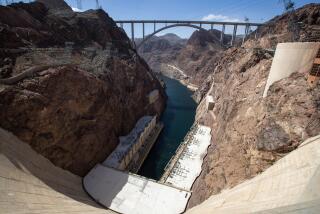Coping With Crisis : Water: San Diegans want to conserve, but a unified vision is vital.
- Share via
With the Metropolitan Water District’s announcement that San Diego’s water allocation may be cut by as much as 50%, community debate about the best way to reduce consumption is heating up.
Voluntary or mandatory? Punitive or positive? Water police or self-policing? This debate will evolve into a unified vision if the following important consumer precepts are heeded.
* Don’t keep customers in the dark.
San Diegans want desperately to do their part to overcome this water crisis. Their good intentions, however, will be thwarted by insufficient information. Water customers need feedback.
The preeminent form of feedback is economic. “Tiered” rates, such as those used by electric utilities since the 1970s, provide the most accurate economic feedback. They reward those who conserve and require water-intensive customers to pay for the luxury. The nearly flat water rates now charged by local water departments are extremely misleading and supply almost no economic disincentive.
Ideally, rates should be structured to reward customers who cut back by 20% to 30%. Water consumed beyond those targets would be priced at a significantly higher rate.
Once the rate structure is changed, a more timely feedback system needs to be devised.
Most water utilities send bills to residential customers every two months. So the average customer must wait that long before learning whether his efforts are successful. This is tantamount to a professor withholding midterm exam grades until the day of the final exam.
Water bills should be mailed out every two weeks, or at least monthly. And the mass media should publish daily a “Saving Success Rate” so the community, as a whole, knows how it is doing each day.
* Don’t raise rates to offset all decreased water consumption.
As customers curtail consumption, water utility revenues will decline. The temptation is to offset this revenue loss by raising rates. This undesirable approach accounts for the chief consumer gripe about conservation: “The less we use, the more we pay.”
Some additional charges are inevitable. But the water agencies should not try to recoup all of the budget shortfall until after the crisis has passed. This strategy has been successfully used by state regulators to buffer the shock of oil price increases and nuclear power plant costs.
* Share the sacrifice.
In 1991, and probably 1992, no one in San Diego will be spared sacrifices. No one. And the water utilities need to make sure they, too, share some of the pain. This means they must take overt steps to reduce their nonessential expenses to convince customers that increased bills will not become institutionalized food to fatten the bureaucracy. For example, if water bills are increased by 20%, utilities may not be able to match that, but they should considerably reduce expenses.
The water utilities will balk at cutbacks and point to greater demands for customer service (reading meters, ferreting out leaks) and education. However, the enhanced customer services should be funded by a “crisis surcharge.”
The surcharge concept is an important one for two reasons: It serves as a reminder of the need to conserve each time the bill is paid, and it shows customers that the special fee is temporary and will be repealed when the crisis ends.
* Kill the mascot. Name a czar.
“Don’t be a Waterhog” should be immediately dispatched to join “Reddy Kilowatt” in public relations heaven. The Waterhog is an old, familiar friend who is incapable of expressing urgency.
Furthermore, the old hog is delivering a very negative message. “Don’t do this” and “Don’t do that” does not nurture the “Let’s all pull together” message that is essential to overcome a crisis.
Past national crises have been effectively presided over by “czars.” Alfred Kahn held the whip over inflation during the late 1970s. More recently, William Bennett barked out orders to the troops fighting the drug crisis. San Diego should begin the search for a “water czar” who brings credibility and objectivity to the job.
The czar should remain independent of the water utilities. This independence will better permit the czar to act as watchdog of the utilities as well as to coordinate public education and enforcement activities.
* Holding hands is more effective than pointing fingers.
The oil shocks of the 1970s frequently lapsed into episodes of accusations and finger pointing that detracted from the conservation effort. By focusing efforts on helping the public join the campaign, the water authorities will themselves be joined by a very willing and very capable corps of supporters.
More to Read
Sign up for Essential California
The most important California stories and recommendations in your inbox every morning.
You may occasionally receive promotional content from the Los Angeles Times.













